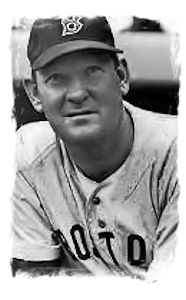 |
Alton “Al” Benton was from Noble, Oklahoma and played one year of high school baseball and one year of semipro ball. His pro baseball career began in 1931 with the Lincoln Links in the Class-D Nebraska State League and also pitched in seven games for the Class-A Western League’s Oklahoma City Indians. For the next two years, he pitched for Oklahoma City as well. In 1934, Al debuted in the major leagues with the Philadelphia Athletics. His first game was a relief stint and then Connie Mack gave him his first start, at Yankee Stadium. He pitched seven innings, yielding only two runs, but lost the game. His first win was more than a month later and he singled to drive in the winning run. He won some and lost some as his first year wore on, but in 1935 his starts declined, and he was sent down to Class-A Williamsport over the last month and a half of the season. The next two seasons were spent in Albany and Chattanooga. Both were Washington farm teams where he worked on option but was recalled to Philadelphia in October. l hurt his hand while fielding a drive back to the box during a 1937 March exhibition game in Mexico City and he required hospitalization. He was sent to Memphis in the Southern Association and in August, his contract was purchased outright by the Detroit Tigers. Al started the 1938 season with the Tigers but was optioned to Toledo at roster cut-down time in mid-May, then recalled back at the beginning of August. He started about half the games in which he appeared, both in 1938 and 1939, but became a full-time reliever in 1940. The Tigers won the pennant that year, losing the World Series in seven games to Cincinnati. In the Series itself, Al was warming up in the bullpen on one or more occasions, never called on him to pitch but did receive a full Series share. Al was an All-Star in both 1941 and 1942, putting together back-to-back years of considerable success mixing starting and relieving. He was 15-9 with a 2.97 ERA in 1941 and improved his ERA to 2.90 in 1942. He pitched the final five innings of the 1942 All Star game, giving up just one run on the way to an AL 3-1 win. There was one remarkable game for Al at the plate, on August 6, 1941. During an 11-run inning against the Indians, he set a record by sacrificing twice in the same inning. Over the course of his 14 seasons in the majors, and 579 plate appearances, he batted just .098 After the 1942 season concluded, Al joined the United States Navy. He missed the full seasons of 1943 and 1944 but was discharged (due to migraine headaches) in time to rejoin the Tigers. He’d played baseball in the Navy and became a starter for Detroit. He won his first five decisions, three of them shutouts. Despite the two years off, he worked to an ERA of 2.02 as the Tigers made it to the World Series. They beat the Cubs, four games to three and this time Al saw some action. But as it happened, the three games in which he appeared, were the three games the Tigers lost. The 1946 and 1947 seasons again saw Al starting and relieving in more or less the same number of games, but his ERA began to climb. In 1948, he was hampered by a back injury and in December, the Tigers unconditionally released him. He appeared in four games at Sacramento before his contract was sold to the Cleveland Indians in 1949. There he was very effective and also had a brief role in the 1949 film, The Kid from Cleveland. He worked just in relief, in 1950 and his 1951 season was spent in the Pacific Coast League, pitching for Sacramento and San Diego. At age 41, Al began the 1952 season with San Diego and the Boston Red Sox purchased his contract in June. He put in a fair amount of work for the Red Sox, relieving in 24 games and recorded a very good 2.39 ERA in 37 2/3 innings of work. His weight had apparently become an issue. He was said to have weighed 240 pounds and there was reportedly a sign in the Fenway Park clubhouse that read, “No potatoes or biscuits for Benton.” He did have the opportunity to pitch against rookie Mickey Mantle several times in 1952, earning the distinction of being the only big-league pitcher to have faced both Babe Ruth (in 1934) and Mantle (1952) in the major leagues. Al was working as a motel manager at the Southern Motel in Lynwood, California after baseball, when an accidental explosion in a motel room burned him severely. He died in St. Francis Hospital of the “extensive thermal burns,” on April 14, 1968. |
|||||
